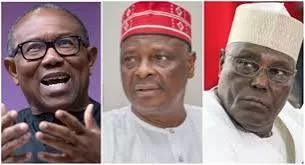
ATIKU, OBI, KWANKWASO IN TALKS OVER 2027
The three leading opposition figures in Nigeria are discussing the possibility of a merger to salvage Nigerians from hunger and widespread insecurity ahead of the 2027 presidential election, a spokesman for the Peoples Democratic Party (PDP) said on Monday.
PDP deputy national spokesman Ibrahim Abdullahi stated this on Channels Television’s Sunrise Daily programme on Monday.
He said the three opposition candidates in the last elections – PDP’s Atiku Abubakar, Labour Party’s Peter Obi and Rabiu Kwankwaso of the New Nigeria People’s Party (NNPP) – would put personal interests aside and form a formidable alliance to defeat the ruling All Progressives Congress (APC) come 2027, and “salvage Nigerians from hunger”.
Abdullahi said that had the party’s past leadership managed differences and party conflicts well, high-ranking chieftains like former Rivers State governor Nyesom Wike, Kwankwaso and Obi would still be full-blooded members of the PDP and the party would have defeated Bola Tinubu of the All Progressives Congress (APC) in the last election.
He said, “We’ve lost Kwankwaso, we’ve lost Peter Obi, all of these people, imagine if they are in the party, we will have gone to win the elections.
“This APC said they defeated us with one million plus (votes), just one of these names that I mentioned would have covered that gap for us and we would have been in power today and certainly Nigerians would not have been confronted with this despair and despondency in the land.”
Asked if the PDP is trying to get Obi, Kwankwaso, Wike and others back into the party, Abdullahi said, “Sure, discussion is ongoing. You will see Peter Obi discussing with Atiku, you will see Peter Obi meeting with (Nasir) El-Rufai. Party management is a very difficult thing and we are doing the best in the quagmire that we have found ourselves. Rest assured, there would light at the end of the tunnel. We have learnt our lessons in a bitter way.”
In the 2023 presidential election, Tinubu, came out tops in 12 of Nigeria’s 36 states, and secured significant numbers in several other states to claim the highest number of votes — 8,794,726, almost two million votes more than his closest rival — Atiku Abubakar of the PDP.
Atiku, who has ran for president six times, got 6,984,520 votes, while Obi, a first-time contestant, secured an unprecedented 6,101,533. Kwankwaso, former Kano State governor, finished fourth, claiming victory in his state — Kano. He secured 1,496,687 votes.
Interestingly, Obi and Kwankwaso were PDP members months before the last poll but cited irreconciliable difference as reasons they exited the party.
Who Will Step Down?
Asked what would happen if Obi and the others returned to the PDP, he said, “One of them would concede for the other and then we would have a direction.
“Our concern as a party and to these people that I have mentioned is to ensure that we salvage Nigerians from this despair and despondency, between maladies of hunger and frightening insecurity in the land. You could see cluelessness and ineptitude on the part of these people managing this country.”
The PDP chieftain said salvaging Nigerians out of the present hardship is more important than the individual ambitions of the trio.
He said, “Atiku is saying if it is better for him to get Nigeria out of this hopelessness, he would do so.
“He (Atiku) must not be in the race. Atiku is saying that it is an entitlement to him as a democrat; the constitution provides for him that he could contest at any time.
“What he is trying to say is that (there) is no ceiling stopping him from contesting. That is his fundamental democratic right but he is not saying that he will force it on the throat of the party or the country.
“I am telling you clearly: Peter Obi is suitably qualified; he can aspire and we will support him if he gets the ticket. Atiku is suitably qualified and if he gets the ticket, we will rally behind him and give him the desired support to salvage Nigerians out of this situation.”
 Premium News
Premium News